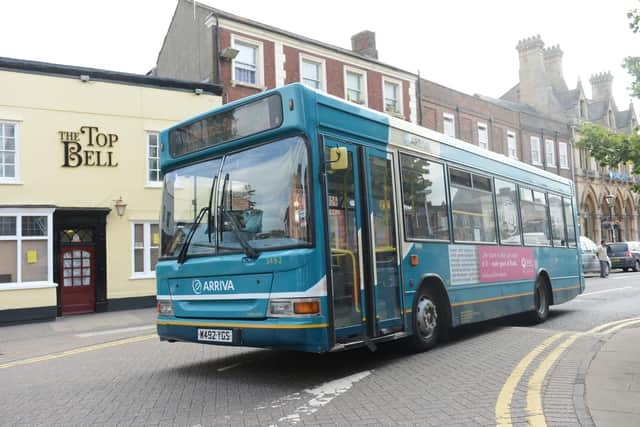Leighton Buzzard risks losing bus services made uneconomic by pedestrianisation
and live on Freeview channel 276
Bus operators could withdraw some services from Leighton Buzzard town centre, if traffic orders remain in force restricting access to the High Street.
Arriva Shires Limited and Grant Palmer say the temporary traffic orders imposed there, and on Lake Street, are holding back recovery, according to a report to a Central Bedfordshire Council traffic management meeting.
Advertisement
Advertisement
The companies say this is "making local bus services less reliable and convenient", said the report.


"The restriction required bus operators to re-route services which had used the High Street to temporary stops provided on West Street.
"All bus operators were concerned the restriction has been reducing passengers on their services so that local services have become uneconomic to operate without extra public subsidy.
"Arriva presented evidence the rate of recovery of the 32, 34 and D1 town services compared to pre-pandemic levels had stalled at a level of 30 to 40 per cent.
Advertisement
Advertisement
"This compared unfavourably with a figure of between 70 and 80 per cent across the rest of the Arriva network," added the report.
"The extra time taken to traverse West Street and Leston Road served to increase running times and impact punctuality."
What do you think about the impact on bus services due to pedestrianisation? Email [email protected].
Arriva said in a letter to CBC: "This closure has had a significant negative impact on bus users forced to use temporary interchange facilities on West Street.
Advertisement
Advertisement
"This location is some considerable distance from the retail area, with cars afforded closer access to the town centre than buses.
"This is clearly at odds with the government’s recently published national bus strategy.
"We can see this impact clearly from the stagnated passenger recovery we have seen in Leighton Buzzard.
"It's beyond doubt the closure of the High Street has had a significant impact on the recovery of passengers and will continue to impact passenger levels until reversed," the company warned.
Advertisement
Advertisement
The risk "Arriva may give notice to withdraw the 32, 34 and D1 services" has triggered a review by the council’s public transport team of "how services might be best arranged in future", explained the report.
"Passenger numbers have recovered on the town’s inter-urban services including the 150, F70 and F77, which aren't at any immediate threat of withdrawal."
Vehicles have been prohibited from entering the High Street since June 2020, in what was meant to be "a temporary arrangement" to support the return of the market and business premises reopening after the pandemic.
The experimental traffic regulation order for the High Street was modified in October 2020, according to the report.
Advertisement
Advertisement
"CBC introduced a one-way operation to a specified length of Lake Street and applied restrictions to various classes of vehicles, with the effect of limiting access to the High Street.
"There was a particular concern to ensure people could move around and queue in relative safety and for businesses to use the High Street area while maintaining social distancing guidelines."
A decision is due to be made on Tuesday (Feb 1) whether to extend these orders.
Conservative Arlesey councillor Ian Dalgarno, who chairs the meetings, will also be asked to consider the option of making a new traffic order for the High Street, allowing entry for buses rather than only on market or event days.
Advertisement
Advertisement
This would be on an experimental basis for at least six months, while a permanent traffic order is suggested for Lake Street on the same terms as at June 2020.
The original proposal was for the experimental orders to operate for a period of up to 18 months.